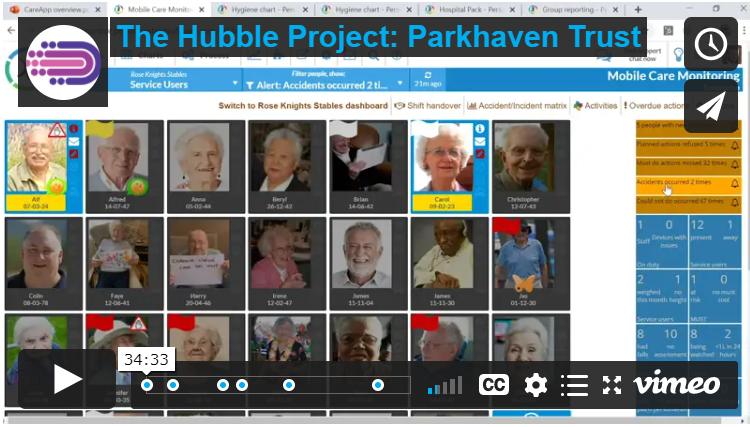
March 29th 2021
The Hubble Project demystifies technology-enabled care and allows care managers and owners to follow other services full TEC journey – warts and all.
The use of technology-enabled care (TEC) has increased rapidly during the coronavirus pandemic. However, not all care providers feel able to take advantage of technology. Many do not know where to start or how to navigate the whole process.
The Hubble Project – developed by the National Care Forum (NCF) with funding from NHS Digital’s Digital Pathfinders Programme – enables care providers to learn from others who have introduced technology.
Based on a series of virtual visits to three innovative care providers, the Hubble Project has now published a series of films, information packs, templates and guides. Senior leaders, managers, care staff and family carers share their experiences of planning, implementing and using technology.
Liz Jones, Director of Policy at the NCF explains:
“Tech-enabled care is here to stay. But care providers are not techies. The Hubble Project demystifies technology and allows care managers and owners to follow other services full tech journey – warts and all. From being clear about what they want to achieve, selecting the tech and building the business case – through to implementation, training and evaluation.
“The Hubble Project clearly demonstrates the value of investing in technology for the long term. The tech that we have seen clearly benefits people who use services, care workers, management and leaders.”
For example, unobtrusive monitoring systems and circadian rhythm lighting, aligned to our natural body clock, are enabling residents at Parkhaven Trust’s specialist dementia care home, The Beeches, to get a better night’s sleep – improving their quality of life, and helping them to be more active during the day. And it is freeing up night staff to focus on those in most need of support.
Elsewhere at Spey House – an extra care housing scheme managed by Johnnie Johnson Housing – wearable technology which incorporates GPS systems is enabling people to remain independent outside of their own homes, but with support on hand when needed.
And at Elizabeth Finn’s Rashwood nursing home, mobile care records connected to electronic medicines administration have reduced medication errors, provided better joined up data to improve care and freed up more time to care.
Liz Jones continues:
“NCF and our partners at NHS Digital and Digital Social Care, are encouraging all care providers to consider technology as an inherent part of care. It is intrinsic to improving the quality of care offered and liberating staff time to spend with the people they support. Everyone in our sector has a role to play in this journey. Commissioners of care should be exploring how they can support the effective use of technology, both in terms of ambitions and funding. And we encourage policy makers to ensure tech-enabled care is a core element of the Social Care White Paper.”
Visit www.digitalcarehub.co.uk/hubble
To discuss the care providers or technology featured in The Hubble Project, contact NCF at: [email protected]
View all News